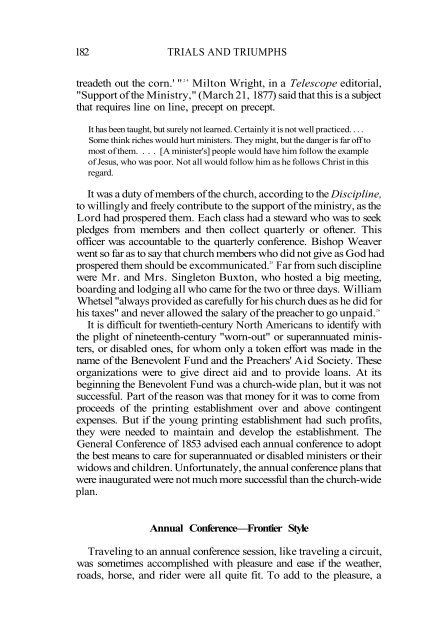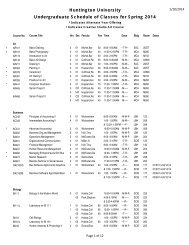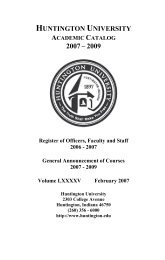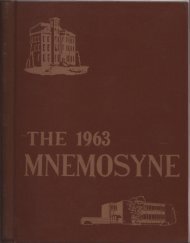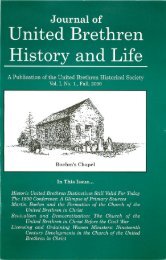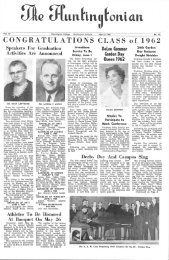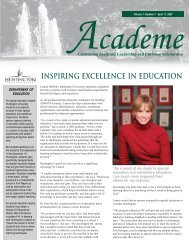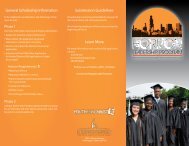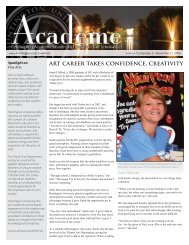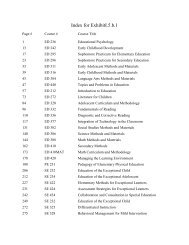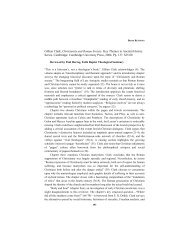- Page 2 and 3:
TRIALS and TRIUMPHS A History of th
- Page 4 and 5:
AUTHORS Part I 1752-1800 The Beginn
- Page 6 and 7:
Table of Contents Part I—THE BEGI
- Page 8 and 9:
Foreword The Church of the United B
- Page 10 and 11:
Conference of 1945. Bishop W. E. Mu
- Page 12:
Part One THE BEGINNINGS 1752-1800 T
- Page 16 and 17:
1 THE YOUNG MISSIONARIES ARRIVE IN
- Page 18 and 19:
THE YOUNG MISSIONARIES ARRIVE IN AM
- Page 20 and 21:
PIETISM, RENEWAL IN THE CHURCH 21 C
- Page 22 and 23:
PIETISM, RENEWAL IN THE CHURCH 23 l
- Page 24 and 25:
3 THE GREAT AWAKENING, FIRE ON THE
- Page 26 and 27:
4 RELIGIOUS LIFE AMONG GERMANS IN C
- Page 28 and 29:
RELIGIOUS LIFE IN COLONIAL AMERICA
- Page 30 and 31:
RELIGIOUS LIFE IN COLONIAL AMERICA
- Page 32 and 33:
RELIGIOUS LIFE IN COLONIAL AMERICA
- Page 34 and 35:
RELIGIOUS LIFE IN COLONIAL AMERICA
- Page 36 and 37:
5 SPIRITUAL LIFE IN THE COLONIES, D
- Page 38 and 39:
SPIRITUAL LIFE IN THE COLONIES 39 p
- Page 40 and 41:
6 MARTIN BOEHM, A GOOD MAN Martin B
- Page 42 and 43:
MARTIN BOEHM, A GOOD MAN 43 became
- Page 44 and 45:
MARTIN BOEHM, A GOOD MAN 45 deeply
- Page 46 and 47:
MARTIN BOEHM, A GOOD MAN 47 enjoyed
- Page 48 and 49:
MARTIN BOEHM, A GOOD MAN 49 12 lbid
- Page 50 and 51:
GEORGE ADAM GEETING, A DESIRABLE CO
- Page 52 and 53:
8 PHILIP WILLIAM OTTERBEIN, THIS MA
- Page 54 and 55:
PHILIP WILLIAM OTTERBEIN 55 candida
- Page 56 and 57:
PHILIP WILLIAM OTTERBEIN 57 Valenti
- Page 58 and 59:
PHILIP WILLIAM OTTERBEIN 59 testimo
- Page 60 and 61:
PHILIP WILLIAM OTTERBEIN 61 Henry H
- Page 62 and 63:
PHILIP WILLIAM OTTERBEIN 63 Tulpeho
- Page 64 and 65:
PHILIP WILLIAM OTTERBEIN 65 Pietist
- Page 66 and 67:
PHILIP WILLIAM OTTERBEIN 67 reminde
- Page 68 and 69:
PHILIP WILLIAM OTTERBEIN 69 Coetus.
- Page 70 and 71:
PHILIP WILLIAM OTTERBEIN 71 explain
- Page 72 and 73:
PHILIP WILLIAM OTTERBEIN 73 tional
- Page 74 and 75:
PHILIP WILLIAM OTTERBEIN 75 A bit o
- Page 76 and 77:
PHILIP WILLIAM OTTERBEIN 77 did not
- Page 78 and 79:
79 DISTINGUISHED CHURCH LEADERS ON
- Page 80:
Part Two THE CHURCH TAKES A NAME 18
- Page 83 and 84:
84 Brethren from Claytonville, Illi
- Page 85 and 86:
86 TRIALS AND TRIUMPHS nia, Virgini
- Page 87 and 88:
88 TRIALS AND TRIUMPHS men who, upo
- Page 89 and 90:
10 THE FIRST ANNUAL CONFERENCE The
- Page 91 and 92:
92 TRIALS AND TRIUMPHS The Conferen
- Page 93 and 94:
94 TRIALS AND TRIUMPHS within the r
- Page 95 and 96:
96 TRIALS AND TRIUMPHS the brethren
- Page 97 and 98:
98 TRIALS AND TRIUMPHS Henry Spayth
- Page 99 and 100:
100 TRIALS AND TRIUMPHS was further
- Page 101 and 102:
102 TRIALS AND TRIUMPHS God of peac
- Page 103 and 104:
12 BEGINNING OF THE CHURCH IN OHIO
- Page 105 and 106:
106 TRIALS AND TRIUMPHS their contr
- Page 107 and 108:
108 TRIALS AND TRIUMPHS crossing th
- Page 109 and 110:
110 TRIALS AND TRIUMPHS action Newc
- Page 111 and 112:
112 TRIALS AND TRIUMPHS ized to pre
- Page 113 and 114:
13 LOSS OF EARLY LEADERSHIP The Uni
- Page 115 and 116:
116 TRIALS AND TRIUMPHS the United
- Page 117 and 118:
118 TRIALS AND TRIUMPHS time he fel
- Page 119 and 120:
120 TRIALS AND TRIUMPHS ministers o
- Page 121 and 122:
14 DEVELOPMENT OF A CONFESSION OF F
- Page 123 and 124:
124 TRIALS AND TRIUMPHS However, si
- Page 125 and 126:
126 TRIALS AND TRIUMPHS tentatively
- Page 127 and 128: 128 TRIALS AND TRIUMPHS Only fourte
- Page 129 and 130: 130 TRIALS AND TRIUMPHS numbers of
- Page 131 and 132: 132 TRIALS AND TRIUMPHS years. Sinc
- Page 133 and 134: 15 EARLY CHURCH GROWTH Following th
- Page 135 and 136: 136 TRIALS AND TRIUMPHS twelve prea
- Page 137 and 138: 138 TRIALS AND TRIUMPHS included in
- Page 139 and 140: 140 TRIALS AND TRIUMPHS baptism of
- Page 141 and 142: 142 TRIALS AND TRIUMPHS and reporte
- Page 143 and 144: 144 TRIALS AND TRIUMPHS Annual Conf
- Page 145 and 146: 146 TRIALS AND TRIUMPHS general and
- Page 147 and 148: 148 TRIALS AND TRIUMPHS liam was co
- Page 149 and 150: 16 CHRISTIAN NEWCOMER Christian New
- Page 151 and 152: 152 TRIALS AND TRIUMPHS glorious Be
- Page 153 and 154: 154 TRIALS AND TRIUMPHS mercy, had
- Page 155 and 156: 156 TRIALS AND TRIUMPHS The Bishop
- Page 157 and 158: 158 TRIALS AND TRIUMPHS answered th
- Page 159 and 160: 160 TRIALS AND TRIUMPHS into two pa
- Page 161 and 162: 162 TRIALS AND TRIUMPHS to the peop
- Page 163 and 164: MEMBERSHIP OF THE FIRST ANNUAL CONF
- Page 165 and 166: NUMERICAL GROWTH OF PREACHERS AND P
- Page 168 and 169: BIOGRAPHICAL DATA As a teenager, Ma
- Page 170 and 171: 18 THE MINISTRY Following the Front
- Page 172 and 173: THE MINISTRY 173 was sent to Wiscon
- Page 174 and 175: THE MINISTRY 175 as bishop 1905-193
- Page 176 and 177: THE MINISTRY 179 company you keep,
- Page 180 and 181: THE MINISTRY 183 group of ministers
- Page 182 and 183: THE MINISTRY 185 that of concluding
- Page 184 and 185: THE MINISTRY 187 continually; and t
- Page 186 and 187: THE MINISTRY 189 to this, man's rea
- Page 188 and 189: THE MINISTRY 191 cleansing blood of
- Page 190 and 191: THE MINISTRY 193 7 Third Annual Rep
- Page 192 and 193: 19 WOMEN IN THE CHURCH Keeping the
- Page 194 and 195: WOMEN IN THE CHURCH 197 was critica
- Page 196 and 197: WOMEN IN THE CHURCH 199 Until 1869,
- Page 198 and 199: UNITED BRETHREN MEETINGS 201 Return
- Page 200 and 201: UNITED BRETHREN MEETINGS 205 others
- Page 202 and 203: UNITED BRETHREN MEETINGS 207 2 Reli
- Page 204 and 205: INSTITUTIONS OF THE CHURCH 209 temp
- Page 206 and 207: INSTITUTIONS OF THE CHURCH 211 Solo
- Page 208 and 209: INSTITUTIONS OF THE CHURCH 213 endu
- Page 210 and 211: INSTITUTIONS OF THE CHURCH 215 subj
- Page 212 and 213: INSTITUTIONS OF THE CHURCH 217 Duri
- Page 214 and 215: INSTITUTIONS OF THE CHURCH 219 and
- Page 216 and 217: INSTITUTIONS OF THE CHURCH 221 Amon
- Page 218 and 219: INSTITUTIONS OF THE CHURCH 223 Thom
- Page 220 and 221: 22 POSITIONS ON MORAL ISSUES Slaver
- Page 222 and 223: POSITIONS ON MORAL ISSUES 227 While
- Page 224 and 225: POSITIONS ON MORAL ISSUES 229 The c
- Page 226 and 227: POSITIONS ON MORAL ISSUES 231 artic
- Page 228 and 229:
POSITIONS ON MORAL ISSUES 233 by a
- Page 230 and 231:
POSITIONS ON MORAL ISSUES 235 The R
- Page 232 and 233:
POSITIONS ON MORAL ISSUES 237 offic
- Page 234 and 235:
POSITIONS ON MORAL ISSUES 239 our m
- Page 236 and 237:
POSITIONS ON MORAL ISSUES 241 It is
- Page 238 and 239:
POSITIONS ON MORAL ISSUES 243 1861
- Page 240 and 241:
23 DISCORD AND DIVISION Resistance
- Page 242 and 243:
DISCORD AND DIVISION 247 included p
- Page 244 and 245:
DISCORD AND DIVISION 249 presiding
- Page 246 and 247:
DISCORD AND DIVISION 251 conference
- Page 248 and 249:
DISCORD AND DIVISION 253 Considerat
- Page 250 and 251:
DISCORD AND DIVISION 255 adoption o
- Page 252 and 253:
DISCORD AND DIVISION 257 as a "feel
- Page 254 and 255:
DISCORD AND DIVISION 259 number req
- Page 256 and 257:
DISCORD AND DIVISION 261 The Genera
- Page 258 and 259:
DISCORD AND DIVISION 263 considered
- Page 260 and 261:
DISCORD AND DIVISION 265 That inasm
- Page 262 and 263:
DISCORD AND DIVISION 267 missionary
- Page 264 and 265:
DISCORD AND DIVISION 269 church as
- Page 266 and 267:
DISCORD AND DIVISION 271 proval, th
- Page 268 and 269:
DISCORD AND DIVISION 273 ence not t
- Page 270 and 271:
DISCORD AND DIVISION 275 hand at Yo
- Page 272 and 273:
DISCORD AND DIVISION 277 22 Charles
- Page 274 and 275:
Top: Philip William Otterbein Botto
- Page 276 and 277:
Top: George A. Geeting Bottom: The
- Page 278 and 279:
283 Christian Newcomer Bonnet's Sch
- Page 280 and 281:
285 Union Biblical Seminary, Dayton
- Page 282 and 283:
Members of the Twentieth General Co
- Page 284 and 285:
289 BISHOPS, 1889-1981 Harold C. Ma
- Page 286 and 287:
291 Above: United Brethren Headquar
- Page 288 and 289:
Huntington College, Aerial View, 19
- Page 290 and 291:
295 Executive Secretaries of the WM
- Page 292:
Part Four THE TRIALS AND TRIUMPHS 1
- Page 295 and 296:
300 Conference of 1953, probably th
- Page 297 and 298:
302 TRIALS AND TRIUMPHS Bishop Milt
- Page 299 and 300:
304 TRIALS AND TRIUMPHS four times
- Page 301 and 302:
306 TRIALS AND TRIUMPHS church was
- Page 303 and 304:
308 TRIALS AND TRIUMPHS few years l
- Page 305 and 306:
310 TRIALS AND TRIUMPHS the same na
- Page 307 and 308:
312 TRIALS AND TRIUMPHS 1889, when
- Page 309 and 310:
314 TRIALS AND TRIUMPHS whole socie
- Page 311 and 312:
316 TRIALS AND TRIUMPHS this genera
- Page 313 and 314:
26 FOREIGN MISSION WORK BEGINS AGAI
- Page 315 and 316:
320 TRIALS AND TRIUMPHS A second li
- Page 317 and 318:
322 TRIALS AND TRIUMPHS equally in
- Page 319 and 320:
324 TRIALS AND TRIUMPHS this centur
- Page 321 and 322:
27 OUR PUBLISHING WORK: TROUBLES AN
- Page 323 and 324:
328 TRIALS AND TRIUMPHS note as a v
- Page 325 and 326:
330 TRIALS AND TRIUMPHS At the 1902
- Page 327 and 328:
332 TRIALS AND TRIUMPHS They answer
- Page 329 and 330:
334 TRIALS AND TRIUMPHS tor in char
- Page 331 and 332:
28 EDUCATIONAL INSTITUTIONS Through
- Page 333 and 334:
338 TRIALS AND TRIUMPHS lege, renam
- Page 335 and 336:
340 TRIALS AND TRIUMPHS ing of the
- Page 337 and 338:
342 TRIALS AND TRIUMPHS missions we
- Page 339 and 340:
344 TRIALS AND TRIUMPHS received so
- Page 341 and 342:
30 THE OTTERBEIN FORWARD MOVEMENT A
- Page 343 and 344:
348 TRIALS AND TRIUMPHS quadrennium
- Page 345 and 346:
31 AN OVERVIEW OF THE PERIOD, 1889-
- Page 347 and 348:
352 TRIALS AND TRIUMPHS Conference,
- Page 349 and 350:
354 TRIALS AND TRIUMPHS dence came
- Page 351 and 352:
356 TRIALS AND TRIUMPHS wore a neck
- Page 353 and 354:
360 TRIALS AND TRIUMPHS that year,
- Page 355 and 356:
362 TRIALS AND TRIUMPHS 13 Alwood w
- Page 358 and 359:
BIOGRAPHICAL DATA Melvin Isaac Burk
- Page 360 and 361:
32 CONTEXT AND CULTURE The period b
- Page 362 and 363:
CONTEXT AND CULTURE 369 Jerry Falwe
- Page 364 and 365:
THOUGHT AND THEOLOGY God," and "the
- Page 366 and 367:
THOUGHT AND THEOLOGY 373 for the fi
- Page 368 and 369:
POLICY AND PROCEDURE 375 ing propos
- Page 370 and 371:
POLICY AND PROCEDURE 377 greater de
- Page 372 and 373:
POLICY AND PROCEDURE 379 Alberta (C
- Page 374 and 375:
POLICY AND PROCEDURE 381 Brethren i
- Page 376 and 377:
OUTREACH AND ORGANIZATION 383 conta
- Page 378 and 379:
OUTREACH AND ORGANIZATION 385 earth
- Page 380 and 381:
OUTREACH AND ORGANIZATION 387 estab
- Page 382 and 383:
OUTREACH AND ORGANIZATION 389 $7,00
- Page 384 and 385:
OUTREACH AND ORGANIZATION 391 progr
- Page 386 and 387:
OUTREACH AND ORGANIZATION 393 produ
- Page 388 and 389:
OUTREACH AND ORGANIZATION 395 the l
- Page 390 and 391:
OUTREACH AND ORGANIZATION 397 1957-
- Page 392 and 393:
OUTREACH AND ORGANIZATION 399 the V
- Page 394 and 395:
OUTREACH AND ORGANIZATION 401 has b
- Page 396 and 397:
OUTREACH AND ORGANIZATION 403 Stewa
- Page 398 and 399:
OUTREACH AND ORGANIZATION 405 being
- Page 400 and 401:
OUTREACH AND ORGANIZATION 407 Breth
- Page 402 and 403:
OUTREACH AND ORGANIZATION 409 years
- Page 404 and 405:
OUTREACH AND ORGANIZATION 411 10 lb
- Page 406 and 407:
OUTREACH AND ORGANIZATION 413 47 Th
- Page 408 and 409:
36 MINISTRY AND MINISTERS The 1930-
- Page 410 and 411:
MINISTRY AND MINISTERS 417 The thir
- Page 412 and 413:
MINISTRY AND MINISTERS 419 For the
- Page 414 and 415:
MINISTRY AND MINISTERS 421 as a min
- Page 416 and 417:
MINISTRY AND MINISTERS 423 chapter
- Page 418 and 419:
MINISTRY AND MINISTERS 425 Between
- Page 420 and 421:
MINISTRY AND MINISTERS 427 pushed t
- Page 422 and 423:
MINISTRY AND MINISTERS 429 To some
- Page 424 and 425:
MINISTRY AND MINISTERS 431 his worl
- Page 426 and 427:
MINISTRY AND MINISTERS 433 3 Discip
- Page 428 and 429:
37 CONCLUDING COMMENTS This survey
- Page 430 and 431:
CONCLUDING COMMENTS 437 Sites, Wilb
- Page 432 and 433:
439 The Christian Church WE believe
- Page 434 and 435:
1901 - May 9-18, King Street United
- Page 436 and 437:
443 Halleck Floyd (1839-1917) 1889-
- Page 438 and 439:
Colleges Founded 1. Otterbein Unive
- Page 440 and 441:
447 The college was again closed fo
- Page 442 and 443:
449 THE UNITED BRETHREN - 1st issue
- Page 444 and 445:
451 Solomon Vonnieda 1853-1861 Henr
- Page 446 and 447:
453 Mrs. B. F. Marot 1876-1881 Mrs.
- Page 448 and 449:
455 GENERAL SECRETARIES OF THE SABB
- Page 450 and 451:
GEOGRAPHIC EXTENSION OF THE UNITED
- Page 452 and 453:
459 ORGANIZED CONFERENCES and MISSI
- Page 454 and 455:
461 Intoxicating drinks, 231-232 It
- Page 456 and 457:
463 Kiracofe, Charles H. (Mrs.), 32


